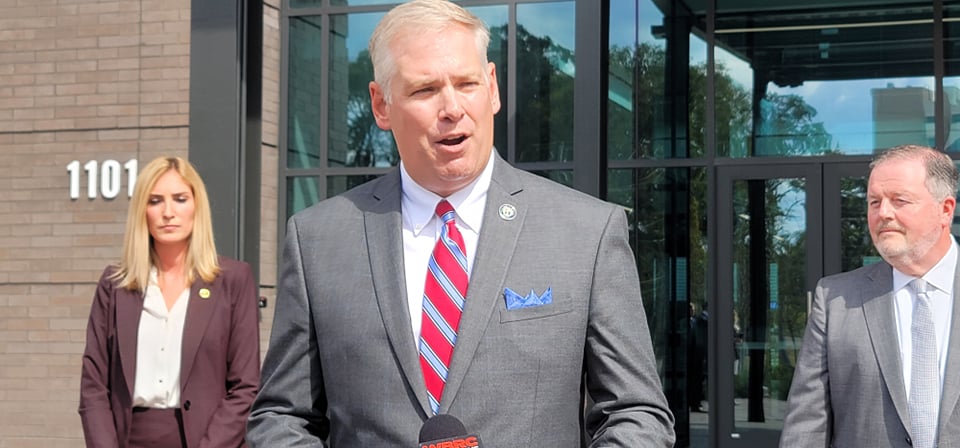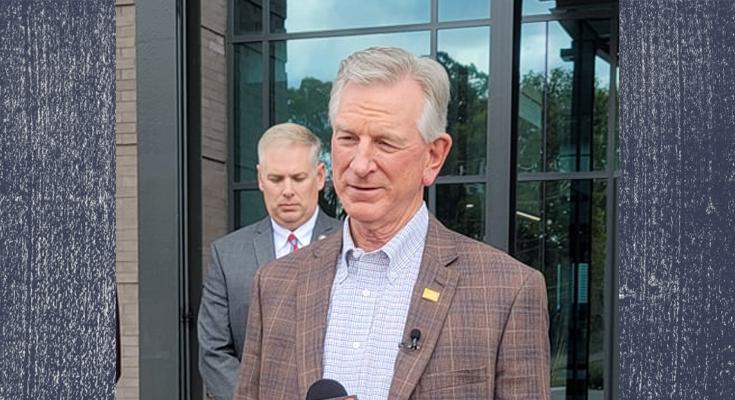"It’s going to cost you a lot of money.”
By Erica Thomas, Managing Editor
Sen. Tommy Tuberville made a stop in Birmingham on Tuesday, Oct. 12, to address an issue he has with the Biden administration’s plan to require financial institutions to report transactions of $600 or more.
Just outside of Birmingham’s Protective Stadium, Tuberville spoke about the Protecting Financial Privacy Act, which he introduced on Sept. 27, to block the president’s proposal.
Tuberville said he hopes all Alabamians are aware of what Biden’s plan is and how it will impact them.
“We don’t need the IRS getting in our business anymore,” Tuberville said. “And what happens, too, is if they think that you owe them any money at all, then they’re going to audit you, then you’ve got to get either another accountant or a lawyer and it’s going to cost you a lot of money.”
Tuberville said he introduced the Protecting Financial Privacy Act to say, “Enough’s enough.” He doesn’t want the government to be involved in personal and business accounts to that extent.
The $3.5 trillion budget reconciliation plan proposed by the Biden administration has not been approved by Congress. Some of the provisions, such as the bank reporting provision, could be removed by lawmakers before it is passed, or the amount requiring a report to the IRS could be changed.
Banks are currently required to report transactions of more than $10,000 to the United States Department of the Treasury and they already report some information to the IRS. But the change Biden is proposing is being considered as a revenue source, as the administration believes it could help find billions of unpaid taxes owed to the federal government. Since the proposal is for budget reconciliation, it would only take a majority vote to pass it. Lawmakers must now decide if they want to keep the provision.
Tuberville and banking officials believe it will also cost the American people more money for things such as bank fees and tax preparation fees. Tuberville said he believes the move could lead to the closure of community banks across the nation.
Chad Jones, President and CEO of First Bank of Alabama, stood with Tuberville outside of Protective Stadium Tuesday.

“What’s not being told is the true cost to everyone that owns a bank account,” Jones said. “Money will flow out of the financial system, less deposits in the system means less loans. Higher cost burdens to financial institutions cause higher prices and the higher prices will be passed onto the consumers.
“This is not a partisan dilemma. This is an attack on consumer privacy laws, and this is too risky and too counterproductive. The banking industry should remain in the business of extending credit to Americans and not policing the IRS.”
According to a survey by Independent Community Bankers of America, 67% of voters oppose the proposal, 64% don’t trust the IRS to monitor their financial information, and 54% don’t trust the IRS to keep their financial information safe.
Steve Swafford, the CEO of the Alabama Credit Union, Scott Latham the President and CEO of the Alabama Bankers Association, and Grace Newcombe, Senior Director of Federal Advocacy and Communications with the Alabama Credit Union, were also at the event to express their support of the Protecting Financial Privacy Act.










